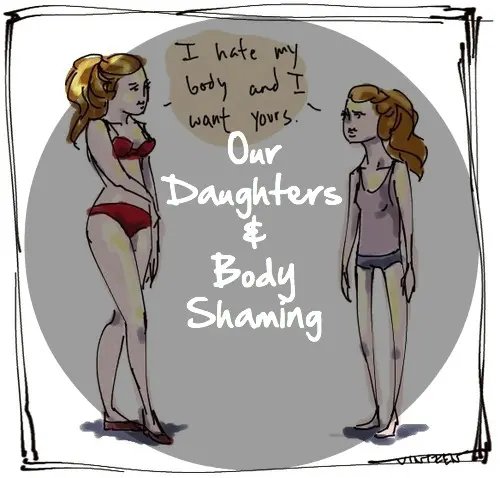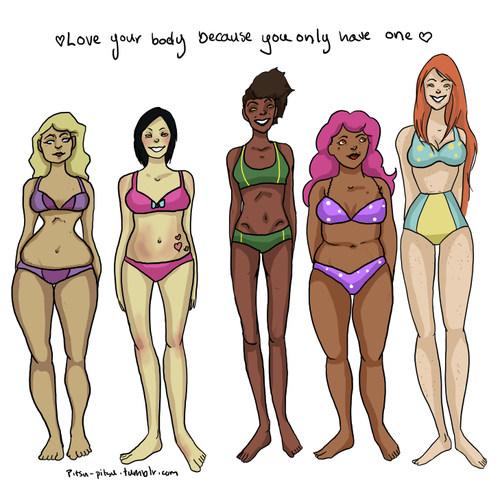Body Shaming. We all have done it—and majority of us still do it on a regular basis—all of which can lead to a poor body image, eating disorders, and self-destructive tendencies. But this post isn’t going to be about our body issues and how to deal with them. This post is about the effect body shaming has on our daughters, nieces, granddaughters and the generation of young women to come. I think it is important that we realize our self-loathing doesn’t just have an effect on ourselves but it has an impact on how our young girls perceive themselves. As infants, our first sounds and gestures are all learned from imitation. As a young girl grows up, she learns how to communicate, act, and behave all by observing those around her.
Discover the damaging effects of body shaming and why it’s time to tackle the pervasive issue of body image issues. This article explores the psychological and emotional impact of body shaming on individuals, as well as the broader societal implications. Learn how we can create a more inclusive and body-positive culture. This blog. post was first published on July 14, 2014 but I have made a few updates and republished it here for my new readers to become familiar with this important topic.

First, what is body shaming?
Here is a body shaming definition in case you are unfamiliar with the term. It is the act of criticizing, mocking, or making negative comments about a person’s body shape, size, weight, or appearance. It can target any body type—whether someone is considered “too thin,” “too heavy,” “too tall,” “too short,” or simply different from cultural beauty standards.
Body shaming can happen in many forms, including:
- Direct insults or teasing
- Subtle remarks disguised as “concern” or “jokes”
- Comparing someone’s body to others or unrealistic ideals
- Self-directed body shaming (when someone criticizes their own body)
Body shaming can have lasting negative effects on a person’s well-being, especially when criticism about physical appearance comes from family members or peers. Constant fat shaming or comparisons to certain body types can lead to low self-esteem and a distorted view of one’s own appearance. Teenage girls are especially vulnerable, as they often face pressure to conform to unrealistic beauty standards, both at home and on social media platforms. This pressure may result in harmful attempts at weight loss or extreme dieting, which can sometimes contribute to the development of an eating disorder.
Beyond emotional harm, weight stigma tied to body weight, body size, or weight gain can also discourage people from adopting healthy lifestyle habits. Instead of promoting self-care, the focus on appearance can trap individuals in cycles of shame and unhealthy coping mechanisms. Young girls often develop body dysmorphia which can lead to physical health concerns and mental health problems. Ultimately, body shaming not only undermines confidence but also prevents society from embracing and celebrating diverse body types.

Body Shaming Is Surprisingly Common
Is it too much of a stretch to say that many of us learned self-directed body shaming from our mothers, grandmothers, female role models, etc. We need to stop passing down this horrible habit that chips away our self-esteem and confidence to the next generation of young girls. I am no way trying to blame anyone but we need to start thinking about the implications our own self-directed body shaming has on the young women around us.
It’s become common practice for women to receive a compliment and then disregard it by pointing out all the things wrong with their bodies. Once I started listening for it and testing it out, I realized how common body shaming is. I started to compliment the women around me and their friends—much to my dismay I got a quick “thank you but I still have about 5 lbs to lose” or “thanks but have you seen these wrinkles?” Body shaming has an impact on self-esteem, mental health, and overall well-being. It is worth working to gain a deeper understanding of the importance of promoting body acceptance and compassion.
The last thing I want is my niece growing up with a negative body image. And I’m sure that is the last thing you want for your daughters, nieces, granddaughters, etc. One way to help the next generation of women is to banish body shaming and start promoting body positivity. I’m not saying body shaming will be an easy habit to break; after all, some of us have been doing it since we were very young. However, it is necessary if we want the generations to come to grow in confidence and strength instead of self hate and criticism. So, for the sake of your daughters, and theirs to come-I think it is crucial to end the cycle now.
How can we end the body shaming cycle?
First we have to recognize the problem. As young girls, I don’t think we are encouraged to receive compliments instead we are encouraged to say a gracious “thank-you” but then mention all the horrible things about us that discount the compliment.
For Example:
Emily: “You’re such a great mom.”
Nancy: “Awww—But you should see my house–It’s a pig pen.”
Sasha: “Your hair looks amazing. I wish I had hair like yours…”
Lauren: “Ah, thank you! But trust me no you don’t, my hair is an oily mess.”
Hailey: “That was a great run, we knocked a minute off our time…”
Becca: “Awesome. But man I look like a sweaty hot mess—I mean come on, I look like a pig..”
Jen: “That dress looks gorgeous on you. I wish I could look like you!”
Nicole: “Thanks. But I wish I didn’t have this bulge of fat right here—It makes me look like I’m a camel with saddle-bags on my back. Ugh. So gross.”
You get the picture. After opening up my ears, I realized how often and frequent we do this. Instead of being proud of our achievements and accomplishments or just being genuinely happy about a compliment, we find some way to turn it into something that is no longer a positive but a negative. Sick, right?
How To Stop Body Shaming and Start Promoting Body Positivity

Stop Turning Positives Into Negatives
So one of the biggest things I think we need to stop doing is turning compliments into a way to body shame or speak negatively about ourselves. In other words, stop criticizing our own bodies. Instead of pushing for weight loss as the main goal, we can promote healthy habits, self-care, and confidence in one’s own appearance.
The image above features the saying “Loving yourself is the greatest revolution.” This is is particularly powerful when we realize that when we start thinking of ourselves as good enough, then we gain power and freedom with no one to please. We are no longer subject to the fashion industry selling us the next slimming outfit. Or the makeup industry selling us the best cover-up, or the pharmaceuticals selling us the next diet pill. It sets us free from men who make seek to control us with their approval or lack there of. Loving ourself is truly revolutionary.
Stop Criticizing Other Women’s Bodies
The second thing we need to do is to quit criticizing other women’s bodies; there isn’t one ideal body type, while social media and the entertainment business might demand there is, trust me, there isn’t. Promote body highlighting and a healthy lifestyle; healthy eating and regular exercise—don’t conform to society’s norms of beauty standards (Trust me, they tend to change. Don’t believe me, just look back at the mid-1800s or the age of the pinup girl, or go back even further. You’ll see that society tends to change its’ perception of “so-called” beauty).
You don’t have to like every body type out there, we are all attracted to different things (hence to why my sister and I have completely different taste in men) but don’t let your taste effect how you rate and treat other people. By saying one is better than the other, you segregate all the women who don’t fit in that category, alienating them and making them feel like they are beneath or their bodies are some how subpar.
Encouraging family members to use positive language, especially around teenage girls, helps create a supportive environment where people feel valued for who they are rather than how they look. By replacing criticism with encouragement, we help reduce the risk of low self-esteem and eating disorders while fostering a culture of respect and body acceptance.
Focus On The Positives
The third thing, which is something I feel like we all have heard a million times but it tends to come in one ear and out the other is—look for the positive not the negative. When you talk about yourself don’t focus on all the things you want to change but focus on the things you are proud of—promote yourself. Whether you are talking to yourself in the mirror or to a friend. It will make you feel better and guess what, the girls around you will see it, and I bet they’ll do the same! In order to be confident, you need to feel confident. What is the best way to do that? Give yourself the extra encouragement and brag about how awesome you really are.
Since I’m not an expert here’s a few additional resources & great articles about body shaming and body positivity:
Body Shaming & Why Do We Do It?
Conclusion
At its core, body shaming stems from societal beauty standards. It often leads to harmful effects on mental health, self-esteem, and overall well-being. That is why it is so important to stop body shaming. Learning how to embrace body diversity can lead to empowerment and self-acceptance. I hope this article empowers you to overcome body shaming and find confidence through embracing your unique body and everyone else’s too. Silence your inner critic. Join the body-positivity revolution and challenge society’s unrealistic beauty standards. Discover how to banish body judgments and create a more compassionate world for yourself and others.
Small actions can make a big difference in building a body-positive community. What are some of the ways you think we can promote body positivity to our young girls? Do you have any suggestions on how we can end the cycle of body shaming? What have been some of your experiences with body shaming and body highlighting? We would love to hear your thoughts in the comments below.
Related Posts:



Pamela Waterman says
Great eye-opener on how body image concerns spread- so true! I’m sending this to my three daughters and my friends with daughters.
Heidi Rogers says
Thanks Pamela! =D I’m so glad to hear you’ll be sharing it with the daughters in your life-hopefully we can spread awareness and break the cycle of unrealistic expectations!
Prerna Sinha says
Lovely blog on body shame-inducing societal standards and so true. Forget young adults,I was doing these types of hurtful comments to myself and thinking I was being humble. From now on consciously, I am going to tell myself ‘I am awesome’ and accept all compliments that come my way 🙂
Erin says
Great post! I think you touched on such an important issue. One of the most common reasons people struggle with body dissatisfaction is the constant cycle of negative thoughts about how they look. I love how you highlighted the importance of shifting toward positive thoughts—it really makes such a difference in building self-confidence and self-worth.
Pearl Marry says
This is such a critical conversation. The impact of words, even those unintentionally spoken by family, echoes for years. It’s not just about praising appearance but about actively valuing their strength, kindness, and curiosity. We must also examine our own insecurities, as our daughters are always watching. Thank you for addressing this; it’s a powerful step toward breaking the cycle.